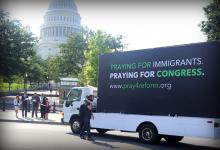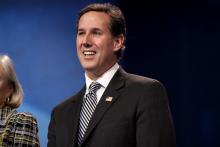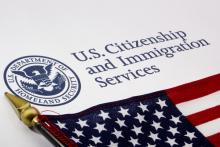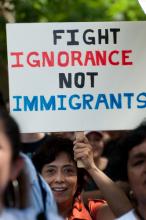Immigration
On Wednesday, July 10th, when most eyes were on the private GOP meeting where republicans gathered in the Capitol basement to strategize on immigration reform in the House, advocates were rallying outside House buildings to urge members to enact immigration reform.
Uncertain of what the next steps are in the House, hundreds of activists, families, and faith leaders all gathered proudly and united in front of the Cannon and Longworth House Office Buildings as they chanted loudly, “Si se puede!”
Not discouraged by the hot summer heat, marchers hoped to catch GOP members as they ended their internal meeting and walked back to their offices.
In the next few weeks President Barack Obama is expected to visit key states throughout the U.S. Making it his mission to explain the economic values immigrants would have on the U.S. if in fact the bill were to pass, democratic officials believe Obama will use his time to highlight financial gains that would come from the passing of immigration reform.TIME reports:
It is, allies concede, a telling sign that the bill’s fortunes are foundering in the fractious Republican-controlled House — and a symbol of Obama’s vanishing clout just six months into his second term. Democratic officials expect that over the coming weeks Obama will travel across the U.S., likely to strategically important states like Nevada, North Carolina and Texas, to highlight the economic benefits of the law. Obama summoned Democratic Senator Chuck Schumer and Republican Senator John McCain to the White House on Thursday to discuss ways to advance the bill in the House. The West Wing is waiting on House Republicans to choose a path on immigration reform before finalizing its strategy, but aides plan a markedly different role for the President over the coming months.
Read more here.
As House republicans meet today in a private meeting to strategize on their approach to immigration reform, all eyes are watching and urging them to steer away from unpractical solutions and enact commonsense immigration reform.
The Wall Street Journal issued an opinion editorial today naming evangelicals as a critical group at risk of being "ignored" if House lets the bill die. The Journal writes:
The dumbest strategy is to follow the Steve King anti-immigration caucus and simply let the Senate bill die while further militarizing the border. This may please the loudest voices on talk radio, but it ignores the millions of evangelical Christians, Catholic conservatives, business owners and free-marketers who support reform. The GOP can support a true conservative opportunity society or become a party of closed minds and borders.
Read more here.

On the eve of the GOP immigration summit, during which Republicans will determine their position and strategy on immigration reform, the Evangelical Immigration Table held a press conference with national leaders to strongly urge House members to find the political courage to move forward on commonsense immigration reform.
“We have forgotten to engage in conversation and instead have focused on throwing stones at arguments,” David Cooper, President and Head of School at Front Range Christian School in Littleton, Colo., said.
Currently, hundreds of Evangelical Christians are expected to join in a day of prayer and action in Washington, DC on July 24, following the 92-day Pray4Reform challenge. During this challenge, people of faith across the country are taking a few minutes each day to lift up their political leaders in prayer as they consider the options moving forward. More than 25,000 prayer partners have signed up for the challenge since its start, and we welcome many more to join.
Simple Truths
The Live Simply series, a set of four booklets based on the values of St. Francis of Assisi, is packed with practical, portable advice about ethical eating, holistic health, creation care, and sensible shopping. Ideal for anyone seeking a life of simplicity and satisfaction in a world of consumption. Franciscan Media
Lost and Found?
A decomposing body is found in the Sonoran Desert, with a tattoo, “Dayani Cristal.” The documentary Who is Dayani Cristal? shows the efforts to find out who this mysterious migrant was and the journey he likely followed. A haunting look at the people affected by the politics of immigration. www.whoisdayanicristal.com
The month of July stands as an important time for Congress as members of the House and Senate attempt to make decisions about six major U.S. issues. Some vital decisions that need to be agreed upon before next month’s recess involve: immigration reform, student loan debates, budget planning, and fiscal issues. The Washington Post reports:
Significant debates await the House and Senate in the coming weeks over a new budget, a new farm bill, federally-subsidized student loans, several key Obama administration nominees and an overhaul of the nation’s immigration laws, which remains the year’s biggest political fight.
Read more here.

There have been Ingelses of my line in the United States, the colonies, since well before our independence was declared. And my mother's family, too, has deep American roots representing various social, political, and spiritual diasporas.
My family lore and mystery include numerous tales of revolutionaries, pioneers, early American educators, statesmen, industrialists, philanthropists, and even Indian captives. Many of you have probably read the works of one of my forebears, Laura Ingalls Wilder, who recounts what life was like for people who headed into great unknowns to make familiar places for themselves, a sense of home, community, belonging.
Other well-known American ancestors were DeHarts and Boones, people whose vigor and muscle are legendary in the colonies and at various points along the frontier.
And of this stock in my stew, I am ever proud.
But every American started as an immigrant, and along the lines leading to me are other sorts of immigrants, too.

Tomorrow, millions of people across this land, will be celebrating our nation’s freedom. Many will be marking Independence Day by going to see the fireworks, watching Fourth of July parades, or just having a barbecue and enjoying time together with their family or friends.
One of the things I began doing a few years ago on the Fourth of July was to call a very special person in my life and in the life of my family. His name is Paul Anderson. Had it not been for Paul and his family, my family and I would not have been able to emigrate in 1987 from Poland to the United States. So on every July 4, I call Paul and thank him for helping me and my family arrive safely and settle in this country.
I tell him that he’s had an important part to play in so many good things I’ve experienced over the past 26 years that I’ve been living here — including discerning a Franciscan vocation and becoming a friar.
Following last week's Supreme Court decisions on DOMA and Prop 8, social ideals within the Republican Party are being brought to the forefront as Republican’s begin to strategize ways to gain support for the 2016 election. The Associated Press reports:
At the same time, the Supreme Court rulings supporting gay marriage attracted broad criticism from most 2016 hopefuls, though Paul suggested that Republicans need to "agree to disagree on some of these issues." That foreshadows likely fissures ahead, as Republican contenders face increasing pressure to show more tolerance toward gay marriage with many Republican voters in their 20s, 30s and 40s calling for acceptance.
Read more here.
ONE OF THE most well-known and revered icons today is Andrei Rublev’s reflection on the Holy Trinity, painted between 1422 and 1425 in Russia. It depicts three angels seated around a table that bears a chalice. The female figures form a circle evoking deep mutuality, interconnectedness, and love between one another. But the circle is open, inviting the world into this profound experience of community. As Christine Challiot, an Eastern Orthodox laywoman, wrote, “Rublev painted the three angels with a circular motion to signify their unity and equality, ‘thus creating a unity to represent the Holy Trinity in its movement of love.’”
This profound reflection is set in the biblical context of giving hospitality to the stranger. The icon depicts the story of the hospitality offered by Abraham and Sarah in Genesis 18:1-15 to three strangers. Abraham rushed to offer them hospitality—water and food.
The three migrating strangers are messengers of God. The text says simply that they were the Lord; interpreters see the three as the presence of the Trinity. And they, in turn, bring an announcement that Sarah, in her old age, will bear a son, fulfilling God’s promises. Sarah and Abraham suddenly find the tables reversed, and they are the guests at God’s table, being invited into this community of love. Thus, Catholic theologian Elizabeth Johnson explains, “This is a depiction of a trinitarian God capable of immense hospitality who calls the world to join the feast.”
This biblical story is a declaration of the unexpected, life-giving presence of God, discovered through providing hospitality to strangers. Rabbi Jonathan Sacks notes that the love of strangers is declared 36 times in the Hebrew scriptures, as opposed to the love of neighbor, mentioned only once. The love of strangers and sojourners is a primary test of one’s love for God; this is linked to the presence of migrating people, with whom we can unexpectedly encounter God in fresh and promising ways that open the future to new possibilities.

Editor's Note: In April, Associated Press representatives said they would no longer recommend the term "illegal immigrant" in the influential AP Style Guide used by many in print media. However, the term is still used by many media outlets and in common parlance. Our hope is that more will follow the AP's lead and rethink its usage.
As the Senate recently passed long awaited immigration overhaul and the bill now heads to the House, the long-standing national discourse on the issue of immigration will likely heat up again. As we participate in these discussions, my hope is that we, especially as Christians tasked with peacemaking and reconciling, will find ways to build bridges instead of erecting walls. As a first step in this bridge building, I pray that once and for all, we will stop using the term “illegal immigrant.”
Here's why:
1. The term “illegal immigrant” is a misleading and dishonest term, which violates the 9th commandment.
The term “illegal immigrant” lends one to believe that an individual is currently doing something illegal, or that their presence in our country is an ongoing, illegal act. In regards to undocumented workers, this is simply not the case. The crime that undocumented workers commit is a violation of “8 U.S.C. § 1325: Entry of Alien at improper time or place,” a federal misdemeanor. Their crime is crossing the border at the improper time and place; however, they are not currently doing anything that is illegal.
Therefore, using this term that has a less-than-honest connotation, is a violation of the commandment to not “bear false witness against our neighbors.”

By a 68-32 vote, the Senate just passed S.744, a bipartisan immigration reform bill that people of faith have held up as part of a solution to the United States’ broken immigration system. While it still has to make its way through the House of Representatives, here are the top 10 things that would happen if S. 744 became law:
1. It would create a roadmap to citizenship for aspiring Americans.
Current immigration law has no way forward for immigrants who don’t have the right documents. The Senate bill would open doors for them to become full members of society.
2. It would bring hope to lots of people.
Around 8 million of the 11.4 million aspiring Americans living in the shadows would be able to gain legal status, giving them hope and opportunity. That’s as many people as live in the entire state of New York – a huge impact.
With only hours left until the Senate releases the final tally of those in favor of immigration reform, House Speaker John Boehner and others prepare as controversial issues are bound to arise at the July 10 “closed-door” conference. The Daily Beast reports:
The closed-door powwow promises to be an electrifying exercise in spleen venting, thrust upon them by their Senate brethren. At some point in the next day or two, the upper chamber is expected to pass its sprawling, blood-sweat-and-tears-drenched overhaul of our FUBAR immigration system. In the run-up to voting, Hill watchers have been aflutter over whether the bill can pull enough Republican support to hit 70 “yeas”—maybe even 71! A procedural test vote Monday topped out at a mildly disappointing 67 (including 15 Rs). But the last-minute horse-trading continues, and reform advocates remain optimistic that the final tally will be big and bipartisan enough to goose the House into passing something similarly sweeping.
Read more here.
Debating whether immigrants will have a positive or negative effect on the United States’ economy, various political groups are arguing their viewpoints and analyzing a number of fiscal pros and cons that would stem from the passage of the immigration bill. The New York Times reports:
An overhaul of immigration law would reduce the federal deficit. That’s the conclusion of a broad range of studies, from the libertarian Cato Institute to the conservative American Action Forum to the liberal Center for American Progress. Wait, it would really increase the deficit. That’s the analysis of the Heritage Foundation and the Center for Immigration Studies. But hang on a second. Immigrants have little impact on the federal deficit. That’s what the Organization for Economic Cooperation and Development thinks.
Read more here.

It’s not the message you might expect to hear from Rick Santorum, the Christian-conservative former presidential candidate: Faith-based films tend to be lousy, and Christians should quit trying to lock modern popular culture out of their lives.
Instead, Santorum says, Christian conservatives should acknowledge that modern popular culture is here to stay, and use that platform to produce Christian-themed films that will also have quality and popular appeal. It’s a strategy he says he intends to pursue in his new role as CEO of a ground-breaking faith-based film studio.
In an interview here, Santorum also stood by his strong views against same-sex marriage, citing the necessity to adhere to religious teachings — but then disputed his own religion’s leaders on the issue of immigration.

A woman who has lived legally in this country for more than 30 years was granted her request to become a naturalized United States citizen Thursday after initially being refused conscientious objector status because she is not religious.
Margaret Doughty, who came to the U.S. in 1980 from England, was informed by U.S. Citizenship and Immigration Services that unless she provided a letter from a church or a religious official by June 21 backing up her assertion that her “lifelong spiritual/religious beliefs” would prevent her from taking up arms for the U.S., her application would be denied.
Immigrants seeking citizenship must pledge to defend the U.S., unless they can prove they are conscientious objectors — people whose religious beliefs prevent them from engaging in war. Conscientious objector status has been awarded to Quakers, Buddhists, and others.
In an attempt to attract conservative voters, undecided senators, and Republicans, talks of doubling border patrol security is in the works. Increasing border patrol security from 21,000 agents, to 42,000 agents, members of the Gang of Eight and Republicans, Bob Corker of Tennessee and John Hoeven of North Dakota have come together and created a package plan to entice conservative’s support for the passing of the immigration bill. Politico reports:
Strengthening border security had long been the major impediment to attracting conservative votes, and a compromise that resolves the issue would significantly improve chances for passage of the overall bill.
Read more here.

People of faith and immigration activists around the country have their eyes fixed on Congress this month as both houses take up immigration reform. The bipartisan proposal being considered in the Senate would bring hope and opportunity to 11 million new Americans who aspire to be citizens, doing much to fix our broken immigration system.
While the path forward will be difficult, there is some good news this week that will influence the way policymakers think about this issue.
Conservative lawmakers have long been worried about the future costs of immigration reform, which they predicted would come from federal programs designed to help the poor such as Medicaid. They asked the Congressional Budget Office – a non-partisan government agency tasked with evaluating the cost of all legislative proposals – to give them a report far into the future to make sure that these costs were not hidden in their analysis.
In reality, the CBO found that bipartisan immigration reform in the Senate would trim nearly $1 trillion off the federal deficit, while spurring the economy and creating jobs.

They have many labels. Undocumented immigrants. Illegal Immigrants. Illegal Aliens. Wetbacks. Jan Brewer, the governor of Arizona, recently suggested that most of them are “drug mules.” Some have even called them “terrorists.” But few are known by their real names or treated as people with real lives.
Most of them live at the edges of the society, under inhumane and dangerous conditions, often separated from their loved ones. For some it may be a choice. However, a vast majority of the 11 million undocumented immigrants in the U.S. are driven to such extremes by factors beyond their control — political crisis, drug-related violence, famine, or eviction from their own homes at gunpoint. Theirs is a story of displacement, of being forced to flee their homes and take risks few would under normal circumstances. They are victims, not the offenders they are often made out to be. Still, for many, it is a story of being treated by the border security as violent criminals, being stripped of their clothes and dignity and separated from their families and traumatized in detention centers. It is also a story of ostracizing and exploitation by parts of the society. The labels and stereotypes about them “otherize” them in ways that prevent their full participation in the society. Injustices like these are the reason why NETWORK’s Nuns On The Bus have been touring across the country speaking out for immigration reform.
Could drone surveillance be the answer to conservative’s immigration uncertainties? Republican senators got together Monday to discuss their ideas on how to ensure tight security between the U.S.-Mexico border if in fact the immigration bill were to pass. Putting into action their notions to strengthen homeland security, Republican senators shared their ideas with a plan to get conservative’s on board with their proposals. Reuters reports:
The proposal is aimed at a satisfying calls by Republicans for further steps to secure the U.S.-Mexico border as part of the legislation currently being debated in the U.S. Senate that would grant legal status to millions of undocumented immigrants already in the United States.
It could include provisions for deploying high-tech surveillance equipment and other specifics, according to congressional sources and people close to the talks.
Read more here.